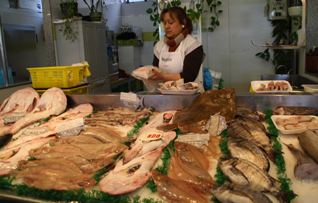 ers in Spain are not reporting an increase in prices despite new food consumption data that shows prices in general are going up, along with consumer spending on groceries.
ers in Spain are not reporting an increase in prices despite new food consumption data that shows prices in general are going up, along with consumer spending on groceries.The inter-annual data of food consumption for 2013 presented recently by the Department of Agriculture, Food and Environment (Magrama) reflects an increase in the total consumer spending on food by 0.6 percent, representing EUR 101.25 billion (USD 139.85 billion). Of that total, domestic food spending has increased by 2.4 percent, whereas food purchased outside the home, such as in a restaurant, declined by 3.1 percent. In addition, the information shows that food prices overall increased by 1.6 percent.
But seafood suppliers consulted by SeafoodSource noted a generalized decrease in all kinds of products both in volume, in turnover and price. Mercedes Rodríguez, manager of the Organization of Fishing Producers of Lugo (OPP Lugo), said "we have noticed a fall in our production, derived also from a drop in the number of fishing units and the quotas, but what we appreciate is a small maintenance or even an improving of the most important fishing species, what we call ‘star species.’"
The President of Fish Suppliers Federation of the Basque Country, Emiliano Sánchez, agrees with her opinion, saying he noticed a decrease both in consumption and in turnover, except in star species, “but the fish consumed on a daily basis is cheaper than (it was) 10 years ago,” he said.
According to Magramar, seafood represented 4 percent of the volume and 13.1 percent of the total expense of the average shopping cart. Also notable was a decrease in purchases of all varieties of frozen seafood products. Emiliano Sánchez thinks that it is due to the price of fresh fish: "being that fresh fish (is) cheaper than 10 years ago (…) then people, before equality of price or for very little more, they prefer eating fresh fish."
The report also shows other interesting information such as what determines the consumers’ choice of establishment at the moment of purchase; 64.1 percent considered the quality of the products the most important factor, followed by good prices (55.3 percent). In addition, 63.4 percent saved money by finding better use of the products, and 73 percent make a list before shopping.
Regarding the consumption at home, the single-parent homes stand out for consumption increasing by 2.8 percent and homes with retired persons by 2.5 percent. On the other side, food consumption fell by 6.3 percent in homes with independent young people and the same for homes with independent adults, where consumption decreased by 0.6 percent.
Regarding the challenges for the future of seafood products in Spain, Mercedes Rodríguez thinks that in spite of the sector insisting on improving the presentation of the product, "it seems that Spain is a country that still likes very much the traditional presentation of the fish." Nevertheless, she believes that "it will be necessary to advance there, however. It will be necessary to improve the presentations and the packaging of the product,” as well as to continue reporting about the kindness of the seafood.
On the other hand, according to Fecope, they sell more fish in Europe that in Spain. He highlighted that they are focusing their efforts in expanding into global markets. At the moment they sell in France, Italy and England but they are trying to introduce their products elsewhere. "We are trying to expand into economically stronger countries like Holland, Germany or Austria. Countries that also consume fish and that it seem that they are very far, but not with the transport of nowadays. Unfortunately, the national market it is in a very bad situation and it does not seem this is going to improve in a short time," he said.





